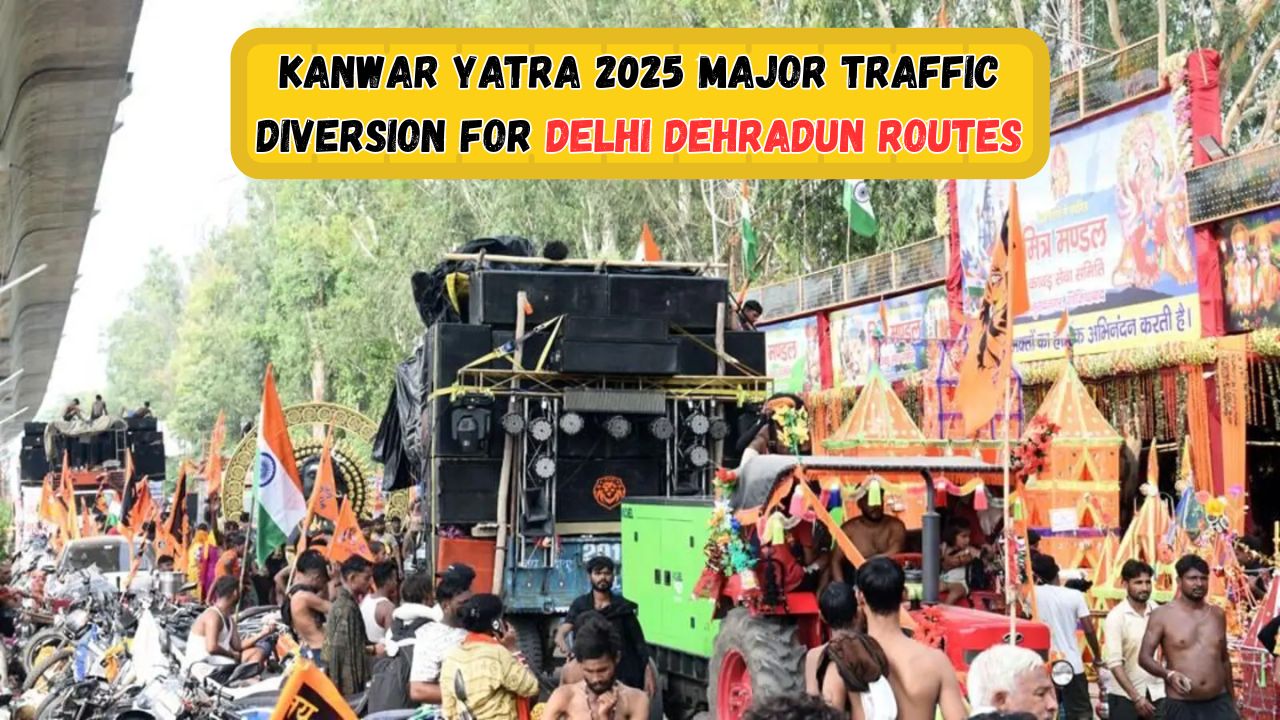Kanwar Yatra 2025 – In preparation for the annual Kanwar Yatra 2025, which attracts millions of Shiva devotees across North India, major traffic arrangements have been rolled out by authorities in Uttar Pradesh and Uttarakhand. With the religious pilgrimage entering its peak phase, a comprehensive traffic diversion and route regulation plan has been implemented along key national highways and arterial roads. The diversion plan will remain effective till 15 July 2025 to ensure the safety of Kanwariyas and smooth flow of traffic for the general public. Commuters, especially those traveling between Meerut, Delhi, Haridwar, and Dehradun, must be aware of these traffic changes to avoid major delays and roadblocks. Here’s a complete breakdown of the Kanwar Yatra 2025 traffic advisory, affected routes, alternate roads, and police arrangements.
Massive Traffic Diversions Announced for Kanwar Yatra 2025
Authorities have released an extensive diversion plan covering NH-58, NH-334, and other key routes. The plan aims to separate Kanwar pilgrims from regular traffic to avoid any chaos or congestion.
Key Diversion Details:
- Traffic restrictions apply from 6 AM to 12 midnight daily.
- Heavy vehicles completely barred on several stretches.
- Kanwariya-dedicated lanes established along Meerut–Muzaffarnagar–Haridwar route.
- Deviation for local traffic in Muzaffarnagar, Meerut, Ghaziabad, and Saharanpur.
List of Roads Closed or Diverted (Till 15 July 2025)
The following table lists major roads and highways affected by the Kanwar Yatra movement:
| Affected Route | Status | Alternative Route | Time Restrictions |
|---|---|---|---|
| Meerut to Muzaffarnagar (NH-58) | Closed for general traffic | Sardhana via Jansath | 6 AM to 12 AM |
| Muzaffarnagar to Haridwar (NH-334) | Closed | Shamli–Laksar Road | 24×7 till 15 July |
| Delhi to Meerut (Expressway) | Partial closure | Bypass via Modinagar–Muradnagar | Nighttime only |
| Saharanpur to Haridwar | Restricted | Nakur–Roorkee | 6 PM to 10 PM |
| Dehradun to Rishikesh | Open for pilgrims only | Non-pilgrims via Harrawala–Doiwala | 24×7 |
| NH-709B (Meerut to Bijnor) | Slow movement | Avoid peak hours | Early morning preferred |
| Ghaziabad to Meerut (Via NH-34) | Heavily congested | Use alternate city routes | All day |
| Haridwar Inner City Roads | Fully restricted | Pedestrian-only zones | Till end of Yatra |
Police Arrangements and Checkpoints Enforced
To ensure law and order and prevent any accidents, over 25,000 police personnel have been deployed across the Kanwar Yatra route. Drone surveillance and CCTV monitoring are being used actively in sensitive zones.
Main Measures Taken:
- 24×7 police control rooms activated in Haridwar, Meerut, and Muzaffarnagar.
- Barricades set up at district borders and highway intersections.
- Medical aid stations placed every 2-3 km along the Kanwar Marg.
- Emergency helplines for both pilgrims and commuters.
- Female constables deployed at key congregation spots.
Alternate Routes Suggested for Commuters
Daily travelers and commercial vehicle operators have been advised to strictly avoid Kanwar routes and use suggested diversions. This will ensure minimal delays and prevent unwanted roadblock encounters.
Recommended Alternate Roads:
- Delhi to Dehradun: Use Saharanpur–Yamunanagar route instead of Haridwar road.
- Meerut to Haridwar: Divert via Sardhana–Shamli–Laksar–Haridwar.
- Ghaziabad to Muzaffarnagar: Take Modinagar–Jansath bypass.
- Dehradun to Rishikesh (non-pilgrims): Use Jolly Grant–Raipur–Nehrugram bypass.
Impact on Daily Life and Transport Services
The Kanwar Yatra causes major traffic gridlocks, especially near Haridwar and Rishikesh. Public transport services, including buses and trains, are experiencing high demand and delays. Emergency services like ambulances and fire services are on priority passes but may face slower transit on blocked roads.
Important Points:
- Avoid unnecessary travel in Haridwar region between 10–15 July.
- Book railway tickets and buses well in advance to avoid last-minute rush.
- Ride-sharing and local taxi services are partially suspended on affected days.
- School and office timings in UP and Uttarakhand have been adjusted.
District-Wise High Alert Zones
Specific districts in Uttar Pradesh and Uttarakhand are on high alert due to massive Kanwariya footfall and logistical challenges. The following table shows districts with the highest restrictions:
| District | Status | Reason | Advisory in Effect |
|---|---|---|---|
| Meerut | Red Alert | Starting point of Kanwar Yatra | Till 15 July |
| Muzaffarnagar | Diversion Zone | Major Kanwar Marg Route | Till 15 July |
| Haridwar | Fully Restricted | Ganga Jal Collection Point | Till 15 July |
| Dehradun | Moderate Alert | Pilgrim transit zone | 10–15 July |
| Saharanpur | Partial Restrictions | Bypass route for pilgrims | Till 15 July |
| Ghaziabad | Congestion Alert | Entry/Exit Point from NCR | Till 15 July |
| Bijnor | Moderate Restrictions | Spillover traffic zone | Till 15 July |
| Roorkee | High Security Area | Entry to Haridwar | Till 15 July |
As the Kanwar Yatra 2025 unfolds with grandeur and devotion, public cooperation with authorities is essential to maintain safety and order. Travelers are advised to strictly follow the updated diversion plans and traffic advisories released by local administration. Avoid peak travel days and stick to designated alternative routes to minimize inconvenience. The combined effort of the public and administration will ensure a smooth and safe pilgrimage for millions of Kanwariyas.
Frequently Asked Questions (FAQs)
Q1. What is the last date of the Kanwar Yatra 2025 traffic diversion?
The traffic diversion plan is effective till 15 July 2025 across key routes.
Q2. Can regular vehicles travel on the Meerut to Haridwar highway during Yatra?
No, most sections of NH-58 and NH-334 are reserved exclusively for Kanwariyas.
Q3. Are there any alternate routes for daily commuters?
Yes, routes via Sardhana, Shamli, and Laksar are recommended alternatives.
Q4. What arrangements are made for emergencies during the Yatra?
Medical booths, emergency vehicles, and control rooms are deployed every few kilometers.
Q5. Will public transport be operational during the diversion period?
Public transport remains functional but may face delays or route diversions in key areas.
